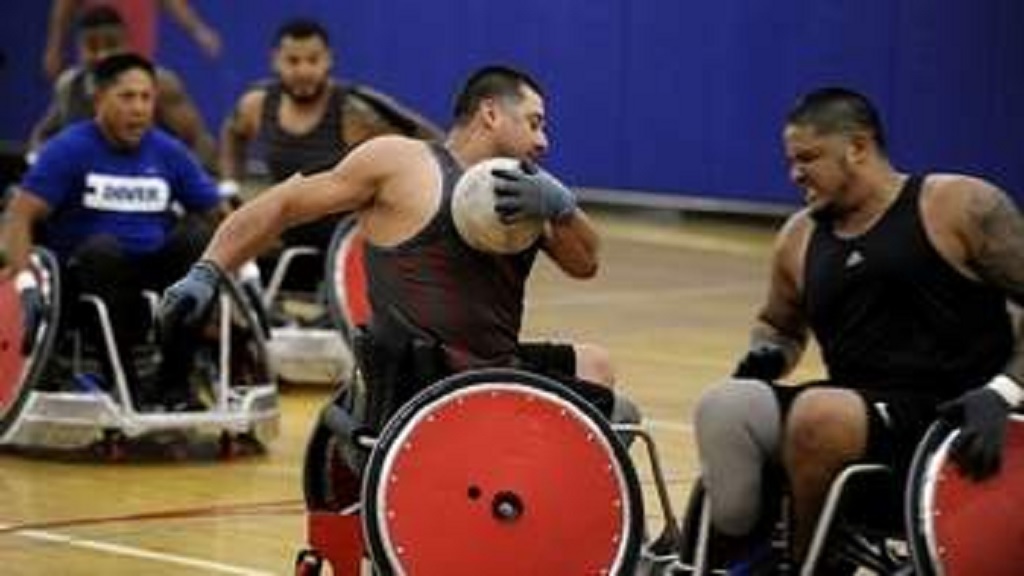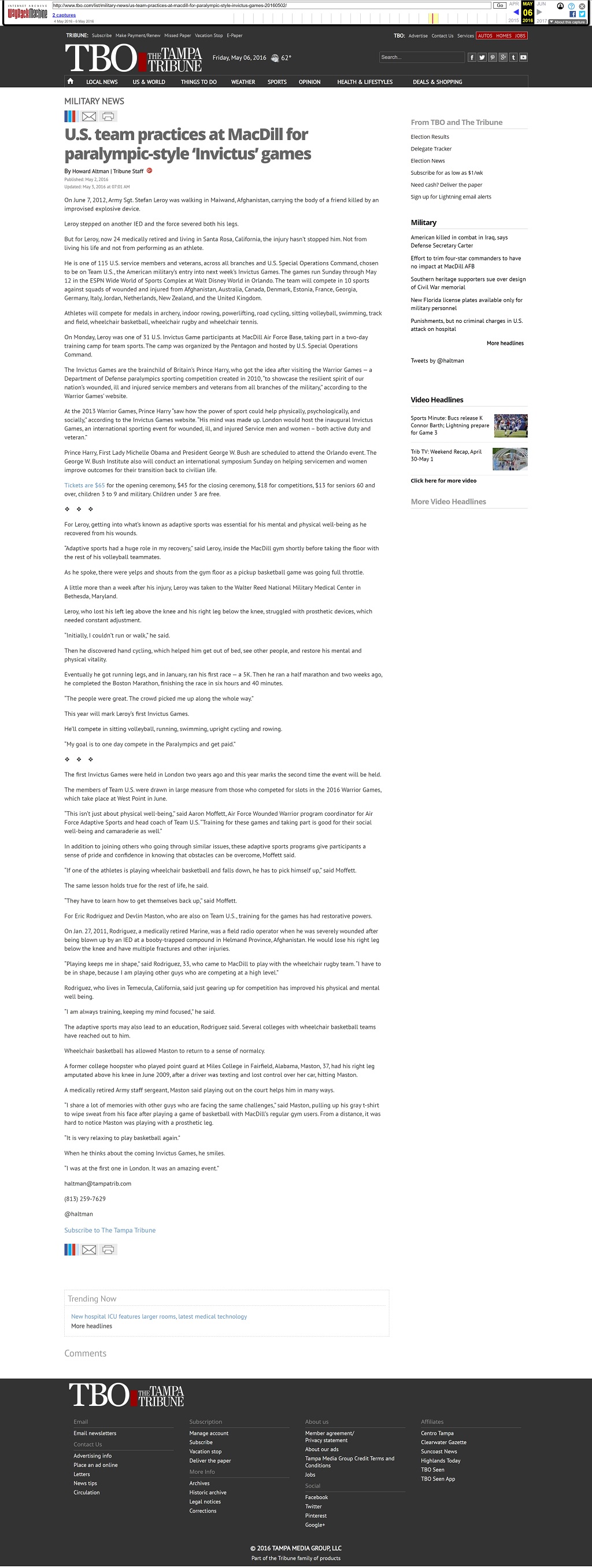The Tampa Tribune / TBO.com
Military News

On June 7, 2012, Army Sgt. Stefan Leroy was walking in Maiwand, Afghanistan, carrying the body of a friend killed by an improvised explosive device.
Leroy stepped on another IED and the force severed both his legs.
But for Leroy, now 24 medically retired and living in Santa Rosa, California, the injury hasn’t stopped him. Not from living his life and not from performing as an athlete.
He is one of 115 U.S. service members and veterans, across all branches and U.S. Special Operations Command, chosen to be on Team U.S., the American military’s entry into next week’s Invictus Games. The games run Sunday through May 12 in the ESPN Wide World of Sports Complex at Walt Disney World in Orlando. The team will compete in 10 sports against squads of wounded and injured from Afghanistan, Australia, Canada, Denmark, Estonia, France, Georgia, Germany, Italy, Jordan, Netherlands, New Zealand, and the United Kingdom.
Athletes will compete for medals in archery, indoor rowing, powerlifting, road cycling, sitting volleyball, swimming, track and field, wheelchair basketball, wheelchair rugby and wheelchair tennis.
On Monday, Leroy was one of 31 U.S. Invictus Game participants at MacDill Air Force Base, taking part in a two-day training camp for team sports. The camp was organized by the Pentagon and hosted by U.S. Special Operations Command.
The Invictus Games are the brainchild of Britain’s Prince Harry, who got the idea after visiting the Warrior Games — a Department of Defense paralympics sporting competition created in 2010, “to showcase the resilient spirit of our nation’s wounded, ill and injured service members and veterans from all branches of the military,” according to the Warrior Games’ website.
At the 2013 Warrior Games, Prince Harry “saw how the power of sport could help physically, psychologically, and socially,” according to the Invictus Games website. “His mind was made up. London would host the inaugural Invictus Games, an international sporting event for wounded, ill, and injured Service men and women – both active duty and veteran.”
Prince Harry, First Lady Michelle Obama and President George W. Bush are scheduled to attend the Orlando event. The George W. Bush Institute also will conduct an international symposium Sunday on helping servicemen and women improve outcomes for their transition back to civilian life.
Tickets are $65 for the opening ceremony, $45 for the closing ceremony, $18 for competitions, $13 for seniors 60 and over, children 3 to 9 and military. Children under 3 are free.
For Leroy, getting into what’s known as adaptive sports was essential for his mental and physical well-being as he recovered from his wounds.
“Adaptive sports had a huge role in my recovery,” said Leroy, inside the MacDill gym shortly before taking the floor with the rest of his volleyball teammates.
As he spoke, there were yelps and shouts from the gym floor as a pickup basketball game was going full throttle.
A little more than a week after his injury, Leroy was taken to the Walter Reed National Military Medical Center in Bethesda, Maryland.
Leroy, who lost his left leg above the knee and his right leg below the knee, struggled with prosthetic devices, which needed constant adjustment.
“Initially, I couldn’t run or walk,” he said.
Then he discovered hand cycling, which helped him get out of bed, see other people, and restore his mental and physical vitality.
Eventually he got running legs, and in January, ran his first race — a 5K. Then he ran a half marathon and two weeks ago, he completed the Boston Marathon, finishing the race in six hours and 40 minutes.
“The people were great. The crowd picked me up along the whole way.”
This year will mark Leroy’s first Invictus Games.
He’ll compete in sitting volleyball, running, swimming, upright cycling and rowing.
“My goal is to one day compete in the Paralympics and get paid.”
The first Invictus Games were held in London two years ago and this year marks the second time the event will be held.
The members of Team U.S. were drawn in large measure from those who competed for slots in the 2016 Warrior Games, which take place at West Point in June.
“This isn’t just about physical well-being,” said Aaron Moffett, Air Force Wounded Warrior program coordinator for Air Force Adaptive Sports and head coach of Team U.S. “Training for these games and taking part is good for their social well-being and camaraderie as well.”
In addition to joining others who going through similar issues, these adaptive sports programs give participants a sense of pride and confidence in knowing that obstacles can be overcome, Moffett said.
“If one of the athletes is playing wheelchair basketball and falls down, he has to pick himself up,” said Moffett.
The same lesson holds true for the rest of life, he said.
“They have to learn how to get themselves back up,” said Moffett.
For Eric Rodriguez and Devlin Maston, who are also on Team U.S., training for the games has had restorative powers.
On Jan. 27, 2011, Rodriguez, a medically retired Marine, was a field radio operator when he was severely wounded after being blown up by an IED at a booby-trapped compound in Helmand Province, Afghanistan. He would lose his right leg below the knee and have multiple fractures and other injuries.
“Playing keeps me in shape,” said Rodriguez, 33, who came to MacDill to play with the wheelchair rugby team. “I have to be in shape, because I am playing other guys who are competing at a high level.”
Rodriguez, who lives in Temecula, California, said just gearing up for competition has improved his physical and mental well being.
“I am always training, keeping my mind focused,” he said.
The adaptive sports may also lead to an education, Rodriguez said. Several colleges with wheelchair basketball teams have reached out to him.
Wheelchair basketball has allowed Maston to return to a sense of normalcy.
A former college hoopster who played point guard at Miles College in Fairfield, Alabama, Maston, 37, had his right leg amputated above his knee in June 2009, after a driver was texting and lost control over her car, hitting Maston.
A medically retired Army staff sergeant, Maston said playing out on the court helps him in many ways.
“I share a lot of memories with other guys who are facing the same challenges,” said Maston, pulling up his gray t-shirt to wipe sweat from his face after playing a game of basketball with MacDill’s regular gym users. From a distance, it was hard to notice Maston was playing with a prosthetic leg.
“It is very relaxing to play basketball again.”
When he thinks about the coming Invictus Games, he smiles.
“I was at the first one in London. It was an amazing event.”

Original URL: http://www.tbo.com/list/military-news/us-team-practices-at-macdill-for-paralympic-style-invictus-games-20160502/

